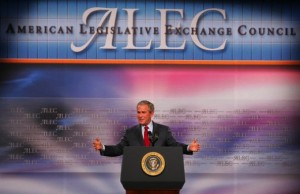 Documents released today shed new light on how corporations are directly drafting legislation through the American Legislative Exchange Council, or ALEC. The Center for Media and Democracy has publicized more than 800 of ALEC’s “model bills†that have been created by corporations, and introduced across the country, all without other lawmakers and the public having any idea of their origins.
Documents released today shed new light on how corporations are directly drafting legislation through the American Legislative Exchange Council, or ALEC. The Center for Media and Democracy has publicized more than 800 of ALEC’s “model bills†that have been created by corporations, and introduced across the country, all without other lawmakers and the public having any idea of their origins.
I have written at length about ALEC’s model “eco-terrorism†legislation, which has been introduced in at least 16 states (a recent attempt in Washington would have made civil disobedience by environmentalists “terrorismâ€). These documents show how this group has a hand in many, many other issues. Busting unions, deregulating energy, gutting health care reforms, privatizing prisons… you name it and ALEC’s corporate members have drafted a bill about it.
This is bigger than any single issue, though, and bigger than what some are describing as a conservative corporate agenda. ALEC should concern everyone, regardless of politics, because it its existence and power are incompatible with a healthy democracy.
How?
Here’s an excerpt from a section in my book that gives an overview of how ALEC works:
Corporations including Philip Morris, R.J. Reynolds, Amoco, Chevron, Shell and Texaco pay nearly all of ALEC’s expenses. The more they pay, the more power they have. Basic membership is $7,000 per year. Joining at increasingly elite levels—the Washington Club, Madison Club, or Jefferson Club— costs up to $50,000.
“Our members join for the purpose of having a seat at the table,†said Dennis Bartlett of ALEC in 1997. “That’s just what we do, that’s the service we offer. The organization is supported by money from the corporate sector, and, by paying to be members, corporations are allowed the opportunity to sit down at the table and discuss the issues that they have an interest in.â€
This is the heart of the Trojan horse. Power in ALEC does not come from political acumen, it comes from brute financial force. Corporations buy their way onto one of ALEC’s specialized task forces. There, “legislators welcome their private-sector counterparts to the table as equals,†according to one ALEC publication. Actually, the corporate counterparts are more than equal. They have veto power. No bill is released from a task force without their approval. The results of such an arrangement are predictable. The task force on criminal justice, for example, has been co-chaired by a represen- tative of Corrections Corporation of America, the nation’s largest operator of private prisons. In 1996, ALEC issued model legislation to deregulate utility markets: the legislation was pushed by Koch Industries and Enron.
After corporate members use ALEC to draft dream legislation, the “model†bills go home with state legislators. The ALEC bills are introduced, debated and voted on by other lawmakers who think the proposals are democratic creations.
Let’s put this another way. Corporations may not be allowed to vote (yet), but through ALEC, they have an even greater power: they craft bills and frame the debate before any votes are cast.
Visit “ALEC Exposed†and check out some of the documents for yourself (they’re all available in zip files). Which bills did you find most outrageous?